When it goes to the Western market for Japanese eroge, VenusBlood FRONTIER is one of the most interesting marketing phenomena in the recent past. Belonging to a series that is most known for its corruption theme and related sexual content, it was rather brilliantly rebranded with a focus on its in-depth gameplay mechanics and the morality system which allows players to shape the fate of its fantasy world in various drastic ways. It is also a game I was highly anticipating because of its rare premise – the ability to play as an anti-hero protagonist who can either become a ruthless oppressor, or a benevolent tyrant protecting the world from destruction and terror. All this coupled with a set of goddess heroines that can be either corrupted into obedient tools, or allied with for the goal of protecting the innocent people trapped in the apocalyptic conflict, and destroying those responsible for starting it.
The international version of FRONTIER is also a bit more than just a Western release of a classic SRPG – it is, by most measures, the definitive version of the game, with significant improvements and new content added thanks to the localisation project's Kickstarter funding. Its goal was very clearly to attract both English-speaking and Japanese players, which at the same time it makes it even more of a notable treat for the non-JP audience. High-budget games of this type very rarely appear outside of Japan, and even less often reach Steam, but the Western release involving significant improvements rather than just cuts and localisation-related glitches is borderline unheard of.
This doesn’t mean that the road onto the biggest PC distribution platform was without hurdles: the final version, released in late January 2020, had to make some concessions when it goes to suggestive content and language, deviating from the initial “all ages” version the studio created. However, the full 18+ version is, in the old-school fashion, available for Steam players through a free patch, and what's worth pointing out, even that version gives a convenient option for opting out of all explicit content. Just by selecting the “skip extra scenes” option in the settings you can avoid h-scenes completely, making the whole game pretty approachable to players that would rather skip the porn and focus on the core story. And in my experience, even the most “compromised” Steam version is a complete-feeling and satisfying experience. But, what exactly it has on offer and can Ninetail really hope for it to get the attention of more "normie" crowds?
This doesn’t mean that the road onto the biggest PC distribution platform was without hurdles: the final version, released in late January 2020, had to make some concessions when it goes to suggestive content and language, deviating from the initial “all ages” version the studio created. However, the full 18+ version is, in the old-school fashion, available for Steam players through a free patch, and what's worth pointing out, even that version gives a convenient option for opting out of all explicit content. Just by selecting the “skip extra scenes” option in the settings you can avoid h-scenes completely, making the whole game pretty approachable to players that would rather skip the porn and focus on the core story. And in my experience, even the most “compromised” Steam version is a complete-feeling and satisfying experience. But, what exactly it has on offer and can Ninetail really hope for it to get the attention of more "normie" crowds?
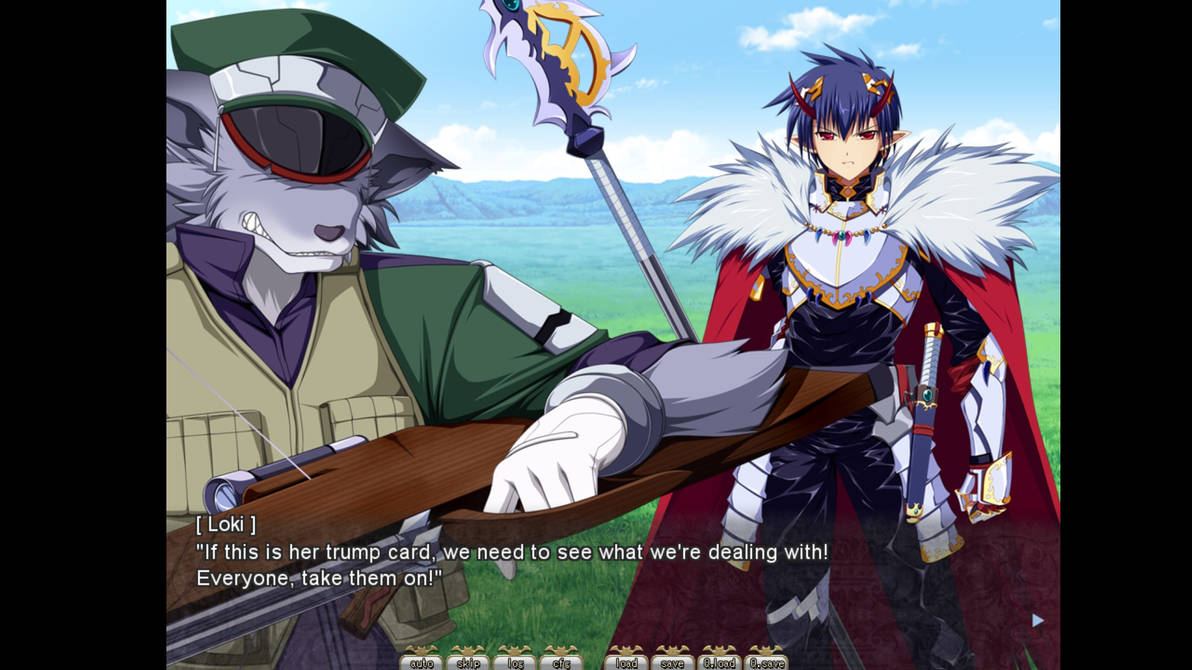
Loki’s character includes the features of a dangerous villain and a sympathetic underdog, making him an interesting and morally ambiguous lead character
VenusBlood FRONTIER follows the story of Loki, a contender to the throne of the Demon Empire coming from a shunned line of the royal family. As the son of a person branded as a traitor, he lived an insignificant life full of humiliation. Thus, when the Demon Lord announces a competition to determine his successor, Loki is the least likely person to win it. Especially because the task in hand – retrieving the Heart of Yggdrasil from the floating continent of the same name, the last land of humans defended by five powerful goddesses – would be an extremely difficult one even for the greatest of demons. For Loki, armed only with his wits, a small band of loyal servants and one barely-functioning airship, it seemed impossible. And that's even without mentioning that he would be competing directly with his four cousins, all of them commanding large armies and possessing massive demonic powers. For Loki, however, this sole occasion to reclaim his family’s status and take vengeance on those that wronged him and his parents was not something he could let slip by.
The protagonist, in my opinion, is one of the greatest strengths of FRONTIER and perfectly plays into its themes and morality system. Loki is a person full of contradiction, having a strong sense of justice, but also being shaped both by his childhood full of resentment and the brutal realities of the demon realm, where only strength or treachery can let one survive. In the desperate quest for power, he’s willing to do almost anything as long as it serves his goals, using layers upon layers of schemes and deception to best enemies who, at first glance, would seem completely out of his league. His main scheme is by itself deeply immoral, as it involves violating and corrupting the goddesses, effectively stripping them of their free will, to create powerful servants that will let him challenge the Demon Lord. At the same time, he does not employ cruelty or violence just for the sake of it, and his ambitions are in some ways noble – he wants power not as a goal in itself, but to save his mother and claim the vengeance for his father’s death. While you can steer him either towards working for stability and prosperity of the world (under his rule) or towards ruthless conquest, his rational and cunning nature stays mostly the same: it’s simply the question of which part of his personality wins in driving his actions in the end.
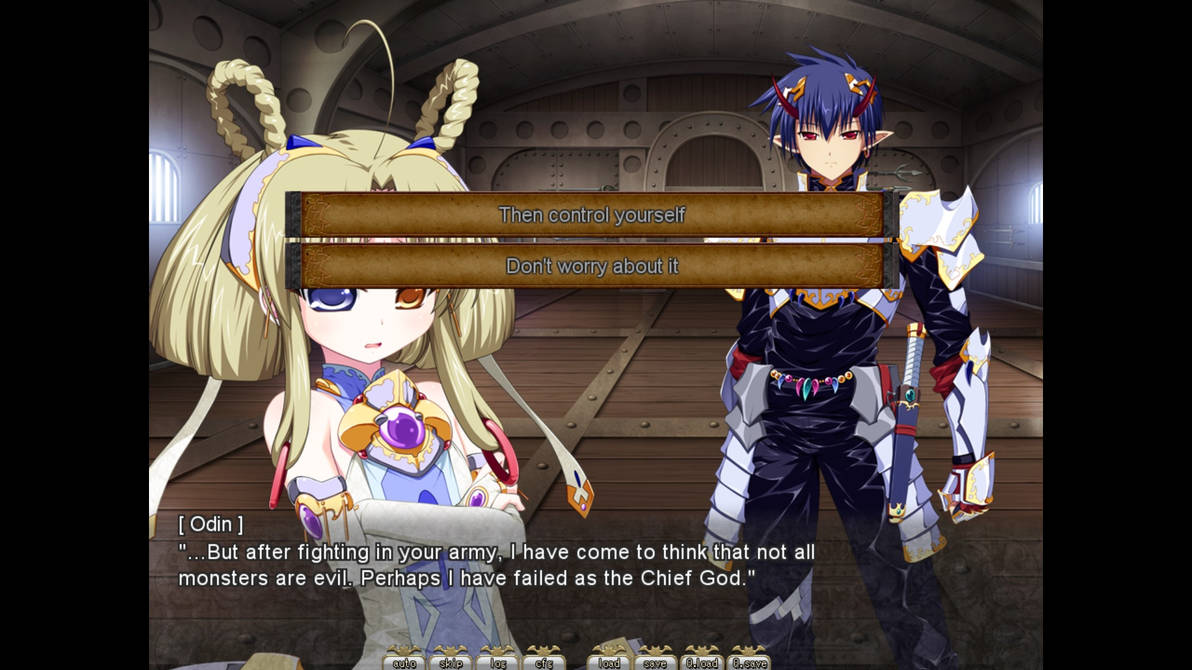
The game’s morality system and well-paced story create a good degree of emotional impact and player agency, worthy of a high-budget VN, despite the strong focus on gameplay and (originally) h-scenes
Loki is surrounded by some similarly colourful individuals, such as his personal maid and secretary Fena (who to a large extent raised him after the fall of his family and serves as his most trusted advisor), or the wolfman field commander of his army, Garm. Pretty early in the game, you also start capturing goddesses, who Loki coerces into working for him, and establishing relationships with his three female cousins, Hel, Fenrir and Jorm, that compete with him for the throne. There are several ways in which you can deal with the heroines, using the game’s interaction system. The goddesses can be corrupted and after a certain threshold, they’ll transform into evil versions of themselves, completely loyal to Loki regardless of his actions. They can also be “mingled” with and convinced to place their hopes with Loki as the only person capable of defeating the Dark Lord and preventing the world from falling into ruin.
What is very unintuitive, to unlock romance endings for the "good" versions of the goddesses and experience the full extent of their stories, you actually have to bring them on the brink of corruption and properly resolve the interactions that result from this – otherwise, you’ll just miss most of it. Similarly, you have to quickly get on the good side of the cousins by "mingling" with them after you recruit them, otherwise, they’ll just leave your army for good and you’ll miss their (quite interesting) arcs, along with the unique story developments that are connected to their presence in the late game. FRONTIER do not really communicate these requirements properly and I’ve missed a lot of content on my first paythrough because of that. Going back to corruption, it’s, interestingly enough, sperate from the karma system that determines the ending you get. Most choices give you either “reign” (good) or “conquest” (evil) points, but all corruption and romance options are compatible with either route if you manage things carefully enough. Some combinations create clear narrative dissonance (like the vile actions committed by the corrupted goddesses in their romance endings, which can clash with your otherwise benevolent rule in “Law” ending), but the ability to create a highly-personalized path through the story is something I hoped from this game and enjoyed a lot.
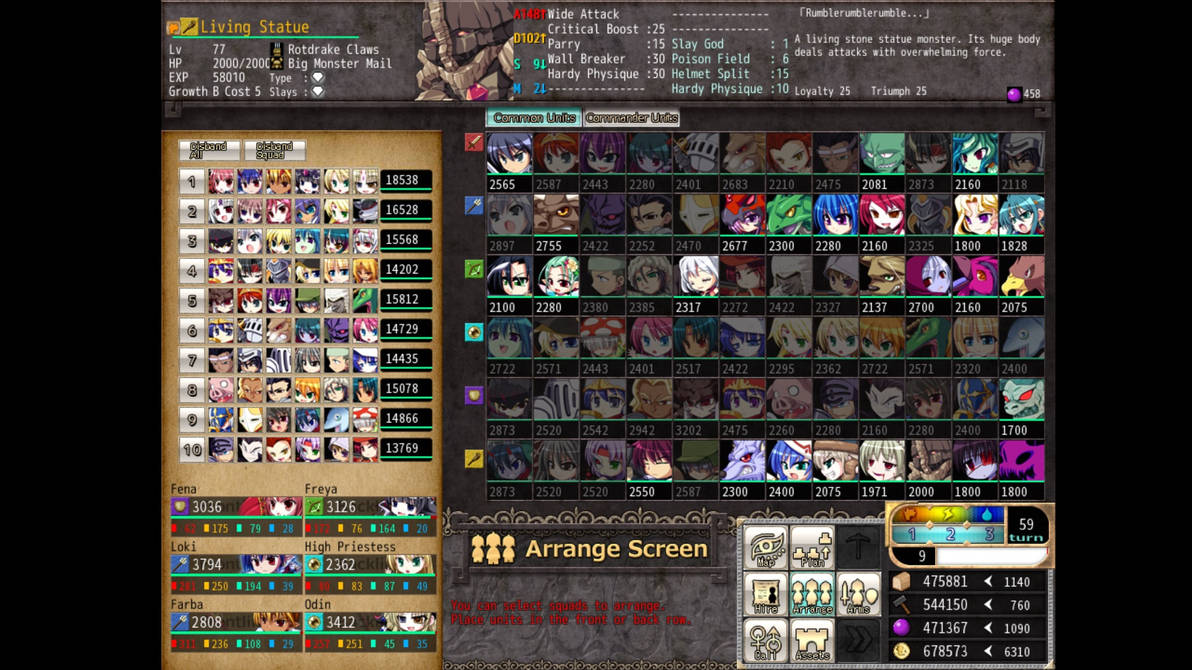
The massive number of available units, skills and mechanics influencing your armies’ performance makes place for some incredibly in-depth strategic gameplay
Gameplay-wise, FRONTIER is a little hard to get into, but offers a lot of depth in its "Strategy RPG" mechanics. This formula, fairly uncommon in Western games, involves training a whole army of units that can level up and be equipped with gear in a fashion similar to JRPGs. These units can then be organized into squads and engage in tactical, turn-based battles. There are dozens of units you can recruit during your play, including commanders such as Loki or the goddesses, who possess powerful active skills, and common soldiers and monsters that form the bulk of your squads. All of them can belong to one of 5 classes and multiple unit types (ex. human, demon, undead, flying), each variation significantly altering their ability to fight in specific positions and against particular enemies. Similarly important are their passive skills, offering often extremely powerful effects, from armor penetration to healing your party at the end of every turn. With additional factors such as terrain types, week cycle with elemental bonuses and gear further complicating things, and with lack of tooltips or easily-accessible help screens, it’s extremely easy to get confused during your early attempts to beat FRONTIER. Thoroughly studying the tutorial available form the main menu is an absolute prerequisite to playing the game with any level of competence, as it doesn’t hold your hand at all if you go straight into the campaign.
Appropriately to the complexity of its mechanics, the game is able to offer an extreme challenge for those interested in it. Playing on medium, I was mostly able to brute-force my way through the battles without switching formations or adjusting my tactics too often. Paradoxically, my laziness at times made the game tedious, as I relied mostly on grinding levels and gear to overcome challenges. On hard, however, that kind of simplistic approach would quickly end in disaster, and the same applies to both New Game+ difficulties. Playing on easy, on the other hand, lets you experience the whole game with no pressure from the enemies and basically no danger of defeat, so it’s the perfect mode to explore alternative story routes. Going back to New Game+, it allows you to not only look for the additional challenge using your well-trained and well-geared army, but unlocks interesting modifiers and the ability to obtain gear and units you can't find on your first playthrough. This gives FRONTIER particularly high replayability for a game of this kind, despite the fairly linear structure of its campaign (outside of the order in which you initially conquer various regions of Ygdrassil and capture the goddesses). Ultimately, it can easily provide dozens of hours of quality content and I’ve personally spent more time with it than I did with any strategy game in a while.
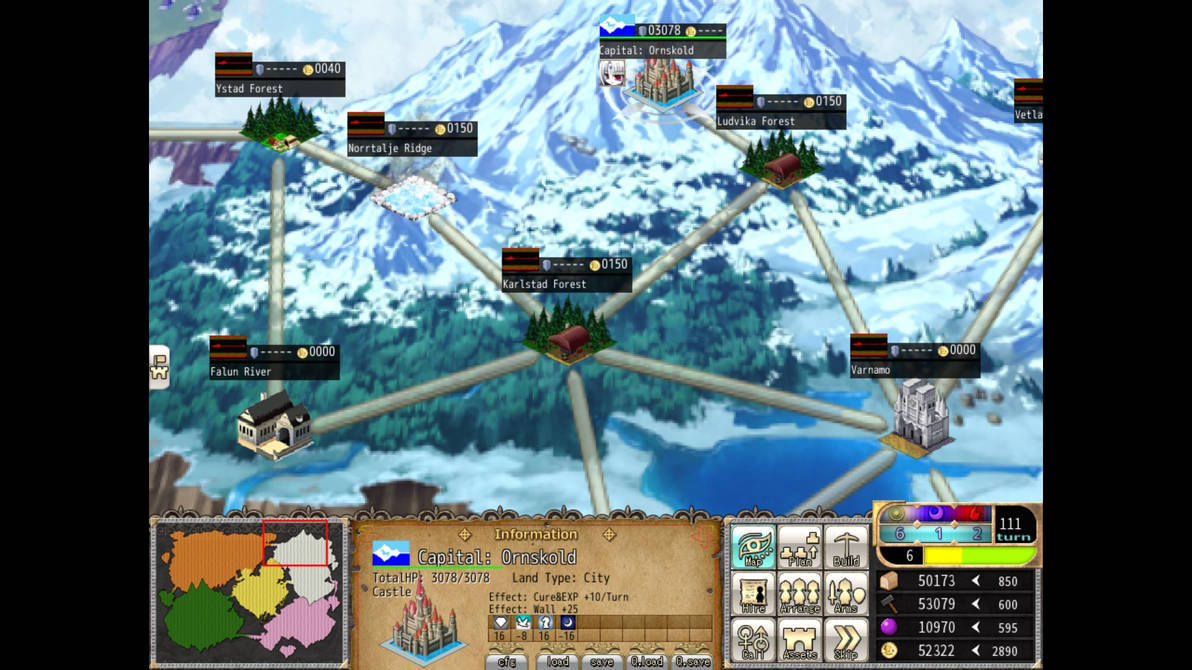
The overworld UI feels clunky and the infrastructure management is basic, but that lets you focus on dealing with your army and (often very demanding) battles without overwhelming micromanagement
From the point of view of production quality, FRONTIER do not stand out very much from other high-budget eroge, but it all-around solid. The biggest complaints I have are connected to the user interface and the overworld map – both look archaic and, even beyond the already-mentioned lack of info on what various stats and mechanics do, are simply not very intuitive to use. The battle screens also look a bit simplistic, with units kind of floating on the screen and, once more, some of the stats are displayed in a way that is not particularly easy to decipher. VN side of things looks much better, and even in the version skipping the vast amount of hentai CGs, the art is plenty and nice to look at. Heroine designs are pretty elaborate, sprites properly expressive, fighting scenes reasonable dynamic and flashy… Generally, everything I’d hope for from a game like this was there, the only surprise being maybe the 4:3 aspect ratio, giving the game an even more archaic feel than the 2012 original release date would justify. Also, it’s probably worth mentioning that despite its relatively-extreme erotic content, the game is not particularly bloody, with occasional macabre being mostly limited to descriptions and not visuals. The soundtrack, for better and worse, is also a rather typical affair for this type of games: quite dynamic, including full songs with lyrics that kick in during the more dramatic moments of the story and which I find near-universally distracting. It’s mostly a matter of taste though and by no definition I'd consider the music bad. The sound design and voice acting left me absolutely nothing to complain about, but that is kind of expected from a Japanese eroge on this level.
Before I wrap up, it’d be appropriate to once more touch upon the issue of the Steam version and the modifications it includes in relation with the game’s "uncut" release. Outside of missing h-scenes, Ninetail was forced to remove some non-explicit story fragments and language that refers to sexual violence – for example, “Train” button in the interaction menu for goddesses was replaced with “Mesmerise” and some dialogue options were stripped of sexually-explicit phrases. The changes aren’t massive and honestly, in some aspects, I preferred how Steam version dealt with things, but for anyone that is sensitive about censorship, downloading the free patch from the developer’s page will restore it to full 18+ version. And ultimately, it’s something I really enjoy about this game’s release – it’s a treat to both eroge fans and those interested solely in its strategy content and the mature-themed story of conquest and politics, without leaving anyone deprived of a version appropriate for their needs. This ability to choose is often lost in the turbulent and underfunded reality of Western VN publishing, and I see what Ninetail did here as a really positive example of what you can achieve if you’re willing to cater to not just one audience group, either all-ages or 18+ oriented. And outside of my personal agenda, FRONTIER defends itself simply as a splendid piece of entertainment and I hope it won’t be the last game from this series that we’ll see published in English. Because of all these things I’ve mentioned, and to make sure VenusBlood has future on the Western market, this one is definitely worth picking up.
Final Rating: 4/5
Pros:
+ Compelling anti-hero protagonist
+ Well-paced story full of enjoyable twists
+ Decently fleshed-out karma and heroine-interaction systems
+ In-depth gameplay mechanics with high replayability
Cons:
– Dated UI with a painful lack of tooltips
– Gameplay can get grindy/tedious
VNDB Page
Buy VenusBlood FRONTIER on Steam or JAST USA Store

No comments:
Post a Comment
Note: only a member of this blog may post a comment.